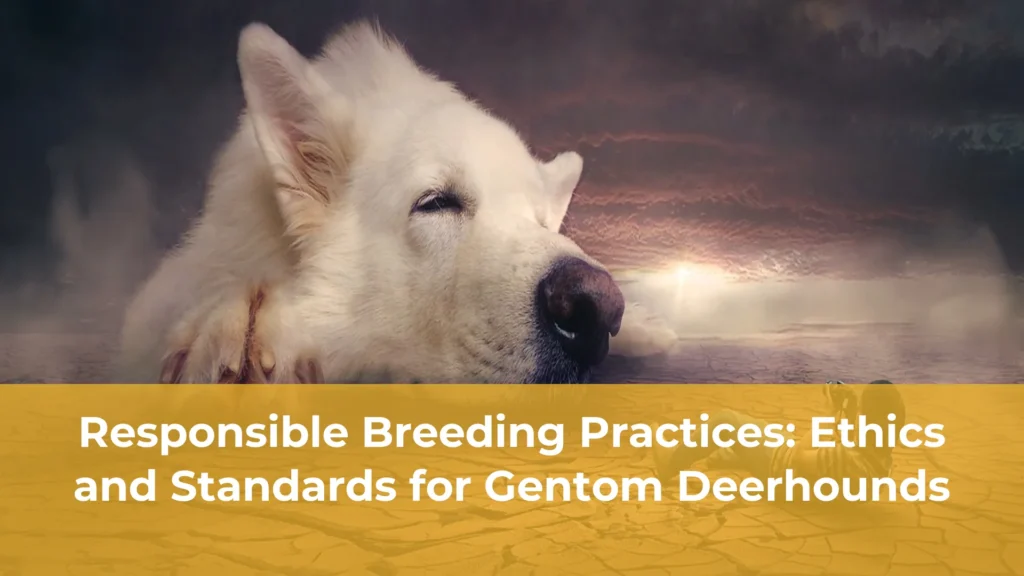Responsible Breeding Practices: Ethics and Standards for Gentom Deerhounds
Responsible Breeding Practices: Ethics and Standards for Gentom Deerhounds
Breeding practices play a critical role in the overall health and well-being of any dog breed. When it comes to Gentom Deerhounds, a magnificent and noble breed, responsible breeding practices become even more essential. This article explores the ethics and standards that breeders must uphold to ensure the continued preservation and betterment of this unique breed.
As the popularity of Gentom Deerhounds continues to rise, it is crucial to address the importance of ethical breeding. Breeders must prioritize the health and temperament of their dogs over profit and superficial traits. By following strict standards, such as health testing, genetic screening, and responsible selection of breeding pairs, breeders can help prevent hereditary diseases and ensure the production of physically and mentally sound offspring.
1. The Importance of Responsible Breeding Practices
Responsible breeding practices play a crucial role in ensuring the health and well-being of animals. Breeding should not be driven solely by profit or appearance, but rather by a commitment to maintaining and improving the overall quality of a breed. Ethical breeders prioritize the health, temperament, and genetic diversity of their animals, as well as potential homes for their offspring. By breeding responsibly, breeders can reduce the incidence of hereditary diseases, promote desirable traits, and avoid contributing to the overpopulation crisis. Moreover, responsible breeding practices encourage collaboration and transparency within the breeding community, fostering a culture of knowledge sharing and continuous improvement. It is imperative that we recognize and support responsible breeders who prioritize the welfare of the animals they breed, ensuring a brighter future for both the animals and the humans who love them.
2. Ethics in the World of Gentom Deerhound Breeding
Gentom Deerhound breeding has become a popular endeavor for many enthusiasts, but questions surrounding ethics have started to arise in this world. While breeding these majestic creatures can be a rewarding experience, it is essential to address the ethical concerns that come with it. This article delves into the various ethical considerations involved in Gentom Deerhound breeding, exploring issues such as genetic diversity, responsible breeding practices, and the well-being of the animals. By examining these topics, we aim to shed light on the importance of maintaining ethical standards within the world of Gentom Deerhound breeding.
3. Raising Awareness: Standards for Responsible Gentom Deerhound Breeders
Raising awareness about responsible breeding practices is crucial in preserving the Gentom Deerhound breed. As the demand for these majestic dogs continues to grow, it is imperative that potential breeders adhere to a set of standards to ensure the health and well-being of the breed. This article delves into the importance of responsible breeding and the guidelines that should be followed by Gentom Deerhound breeders.
The primary goal of responsible breeding is to produce healthy and genetically sound Gentom Deerhounds. Breeders must prioritize the overall well-being of the dogs and strive to eliminate any hereditary health issues within the breed. By conducting thorough health checks, such as genetic testing, hip and elbow evaluations, and eye examinations, breeders can make informed decisions and reduce the risk of passing on genetic diseases to future generations.
In addition to health considerations, responsible breeders also focus on maintaining the breed’s unique characteristics and temperament. They carefully select breeding pairs that complement each other and preserve the breed’s distinct traits. This ensures that Gentom Deerhounds continue to exhibit the desirable qualities that have made them beloved by enthusiasts worldwide. By adhering to these standards, responsible Gentom Deerhound breeders contribute to the long-term sustainability and prosperity of the breed.
Frequently Asked Questions (FAQ)
What are the ethics of breeding?
The ethics of breeding involve considerations of animal welfare, genetic health, and responsible ownership. It is essential to ensure breeding practices prioritize the well-being of the animals and do not contribute to overpopulation or the perpetuation of genetic disorders.
What are the ethics of the Kennel Club?
The Kennel Club is responsible for promoting the breeding and showing of pedigree dogs. Its ethics revolve around promoting responsible dog ownership, breed health, and welfare standards for the well-being of dogs.
How many times is it ethical to breed a dog?
Ethics surrounding dog breeding vary, but responsible breeders prioritize the health and well-being of the animals. Generally, breeding a dog should be limited to a few times, focusing on the quality of the offspring rather than quantity.
What are the problems with male dogs breeding?
Male dogs breeding can contribute to overpopulation, as they can father numerous litters. Additionally, unneutered males may exhibit aggressive behavior, marking territory, and roaming tendencies. Controlling breeding through responsible ownership is crucial.

